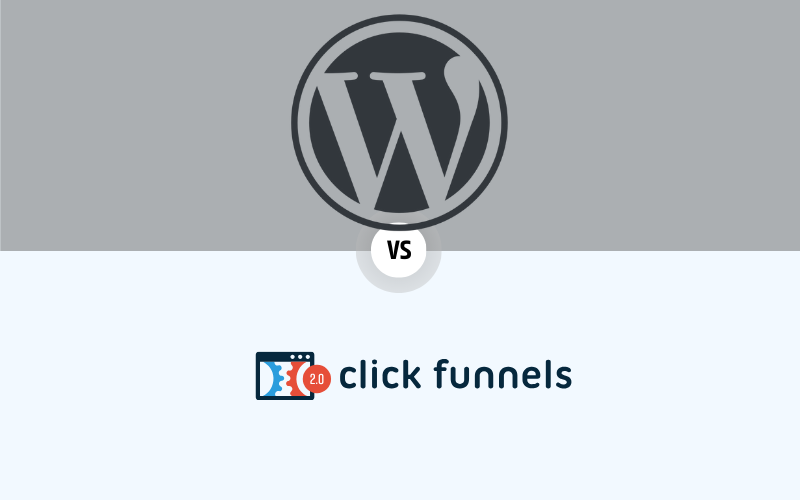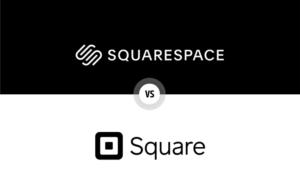When embarking on a digital journey, the choice of platform can make a significant difference in the trajectory of your online success. This introduction sets the stage for a deeper dive into two of the most popular tools for building an online presence: WordPress and ClickFunnels.
WordPress is a comprehensive content management system (CMS) that allows for the creation of a wide array of websites, from simple blogs to complex e-commerce platforms. It is renowned for its adaptability, extensive plugin architecture, and a vibrant community that supports it.
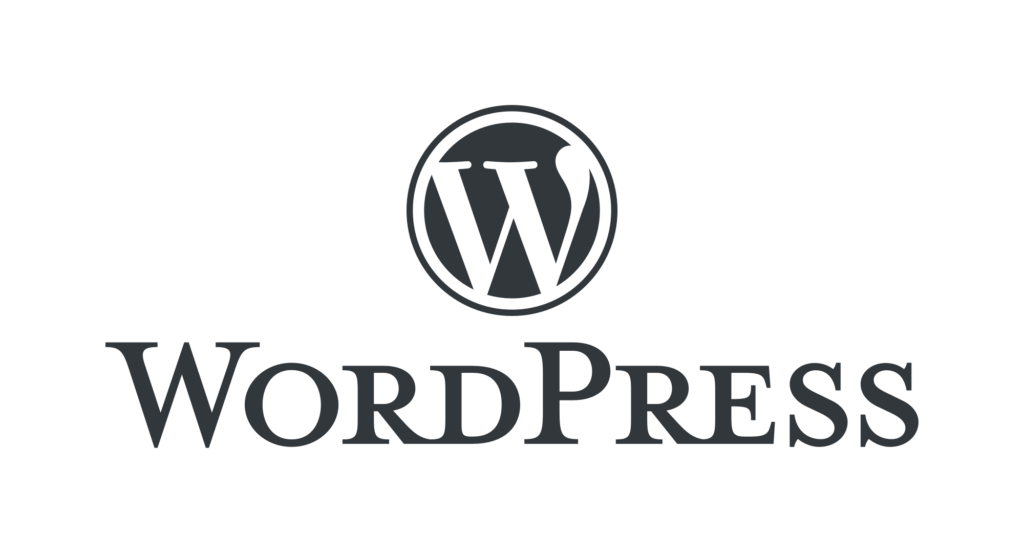
ClickFunnels, on the other hand, is a specialized sales funnel builder designed to optimize the process of guiding potential customers through the different stages of the purchasing journey. It focuses on maximizing conversions and sales with its array of funnel options and marketing tools.

This introduction aims to lay the groundwork for understanding how each platform serves its users, how they differ, and where they excel. Whether you’re a business owner, a marketer, or a content creator, gaining insights into WordPress and ClickFunnels will help you make an informed decision on which platform aligns best with your digital objectives.
Navigating the digital landscape can be daunting, but with the right information, you can chart a path to online success. Stay tuned as we explore the intricacies of WordPress and ClickFunnels, leading to a well-rounded conclusion that will empower you to choose the tool that fits your vision for growth and engagement.
| Feature Category | WordPress | ClickFunnels |
|---|---|---|
| Ease of Use | ✔️ – Versatile but steeper learning curve | ✔️ – User-friendly with an intuitive interface for funnels |
| Design and Customization | ✔️ – Vast array of themes and customization options | ✔️ – Streamlined customization options focused on funnels |
| Functionality and Features | ✔️ – Highly extendable with plugins | ✔️ – Focused on sales funnel creation with built-in features |
| E-Commerce Capabilities | ✔️ – Extensive with plugins like WooCommerce | ✔️ – Integrated e-commerce features but less extensive than WooCommerce |
| SEO and Content Management | ✔️ – Powerful with the use of SEO plugins | ❌ – Basic SEO capabilities |
| Integration and Plugins | ✔️ – Wide range of integrations and plugins available | ✔️ – Good range of integrations, especially for marketing |
| Marketing and Sales Tools | ✔️ – Requires plugins for advanced capabilities | ✔️ – Built-in advanced marketing and sales tools |
| Pricing and Value for Money | Varies from free (with paid options for hosting/plugins) to premium plans | Monthly or annual subscription plans with a few tiers |
| Performance and Speed | Depends on hosting and optimizations | Generally high performance and optimized for speed |
| Security and Reliability | ✔️ – Good with proper security measures and plugins | ✔️ – Managed security but less control than self-hosted solutions |
| Support and Community | ✔️ – Extensive community support and resources | ✔️ – Quality support with resources but smaller user community |
| Scalability | ✔️ – Can scale with the right infrastructure | ✔️ – Scalable within the platform’s funnel-focused ecosystem |
| Success Stories and Case Studies | Diverse across various industries | Primarily focused on successful marketers and online businesses |
Table of Contents
Ease of Use WordPress vs. ClickFunnels
When it comes to building and managing an online presence, the ease of use of the platform you choose is crucial. This is especially important for entrepreneurs and business owners who need to focus on growing their business rather than getting bogged down in technical details.
WordPress is an open-source content management system (CMS) that powers a significant portion of the web. It’s known for its flexibility and vast ecosystem of themes and plugins, which allows for extensive customization. However, this versatility comes with a complexity that can be daunting for beginners. The WordPress dashboard provides access to an array of settings and options that give users control over their site, but it also requires a basic understanding of web hosting, domain configuration, and theme management.

On the other hand, ClickFunnels is a web-based software that specializes in creating sales funnels. It is designed to be user-friendly, enabling users to build and optimize sales funnels without any coding knowledge. The drag-and-drop interface simplifies the process of creating custom pages and funnels, making it more accessible to those without a technical background. ClickFunnels’ dashboard is streamlined and focused, providing tools and features that are relevant to funnel building and conversion optimization.

In summary, WordPress offers unparalleled customization and control, which is excellent for users who are comfortable with a steeper learning curve. Meanwhile, ClickFunnels shines with its ease of use, especially for those looking to create and manage sales funnels quickly and efficiently. The choice between WordPress vs. ClickFunnels may ultimately come down to the specific needs and technical comfort level of the user.
Design and Customization
Design and customization are at the heart of creating a unique and engaging online presence. Whether it’s for a personal blog, a business site, or an online store, the ability to tailor the design to fit your brand and message is essential.
WordPress is renowned for its vast selection of themes and customization options. With thousands of themes available, both free and premium, users can choose a design that closely matches their vision and then tweak it to perfection. The customization possibilities with WordPress are nearly endless, thanks to a wide array of plugins and widgets. Users can alter layouts, colors, fonts, and functionality to create a truly bespoke website.

Moreover, WordPress has a robust editor that allows users to edit code directly, offering even more control over the site’s design. This makes it a preferred choice for designers and developers who require deep customization capabilities. A screenshot of a theme being customized, or the theme editor in action, could be a valuable addition here, highlighting the customization process.
In contrast, ClickFunnels prioritizes efficiency and effectiveness in design over extensive customization. The platform offers a range of pre-designed funnel templates that are optimized for high conversions. Users can easily modify these templates using the platform’s drag-and-drop editor. While the design options in ClickFunnels are more limited compared to WordPress, the available designs are specifically crafted to guide visitors towards making a purchase or becoming leads.
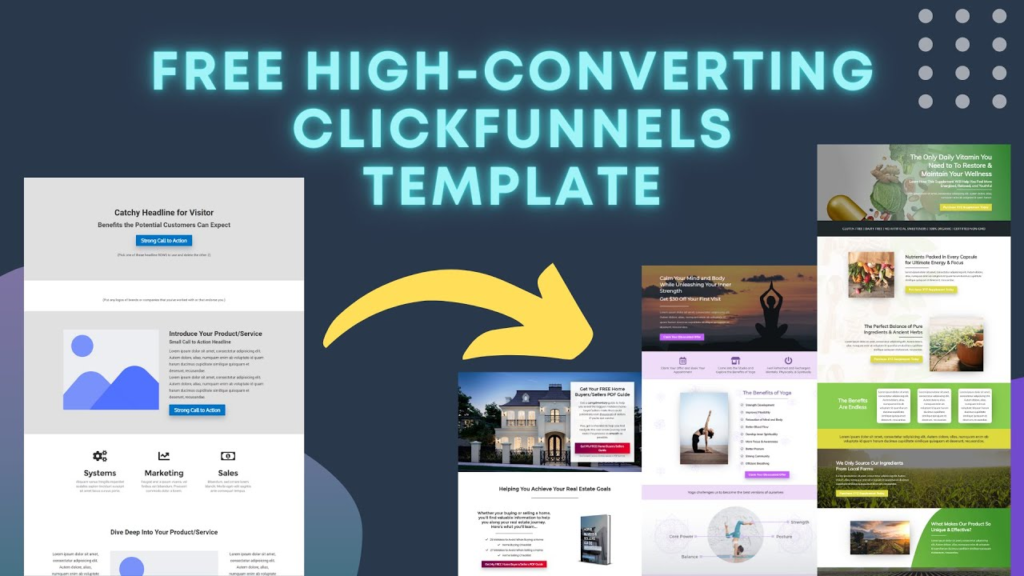
ClickFunnels’ design simplicity ensures that users can launch their funnels quickly without getting overwhelmed by too many choices. This focus on simplicity and conversion optimization makes ClickFunnels an attractive option for entrepreneurs and marketers who are more concerned with the performance of their funnels than with intricate design details.
In conclusion, the choice between WordPress and ClickFunnels for design and customization will depend on the user’s priorities. If complete control and a wide range of design options are what you seek, WordPress is the way to go. However, if you need a straightforward, conversion-focused solution, ClickFunnels offers the necessary tools to get the job done with less fuss.
Functionality and Features
When selecting a platform for your online project, understanding the functionality and features each one offers is essential. These capabilities define what you can do with your site or sales funnel and how well it will perform its intended tasks.
WordPress boasts an extensive set of features and functionality, largely thanks to its open-source nature and the global community that supports it. Out of the box, WordPress provides a robust content management system that allows for the creation of posts, pages, and custom content types. The real power of WordPress, however, lies in its plugins. With over 50,000 plugins in the official repository alone, the WordPress platform can be extended to include e-commerce, SEO, social media integration, membership sites, and much more.
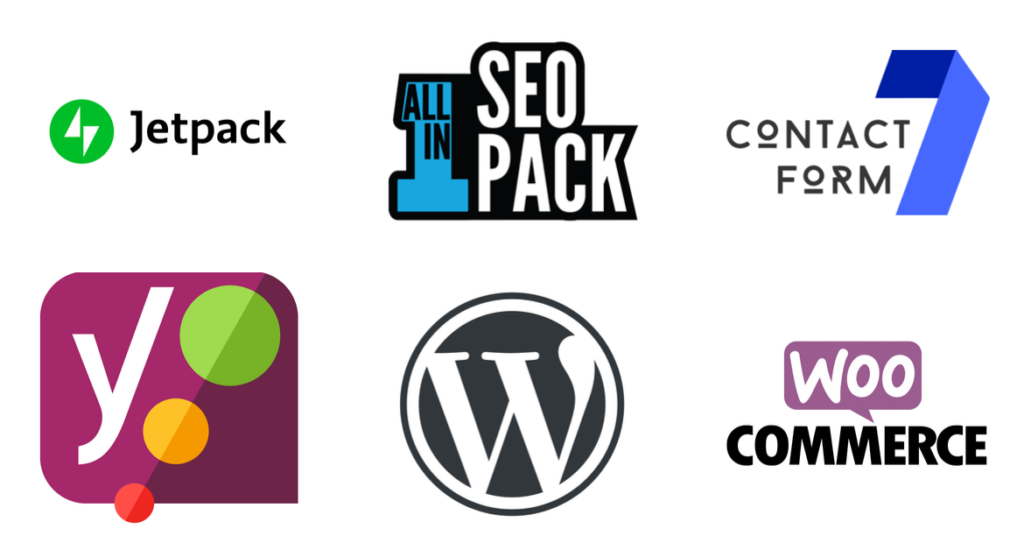
WordPress is also a champion of web standards, ensuring your site is compatible with the latest web technologies and responsive to various devices. For developers, WordPress offers hooks and filters which enable the customization of nearly every aspect of the site’s functionality. A visual of the plugin installation interface or the theme customizer could be included here, demonstrating the user-friendly nature of extending WordPress, without needing to touch code.
On the other side, ClickFunnels offers a streamlined set of features focused on building and optimizing sales funnels. While it may not have the breadth of WordPress, it compensates with depth in its niche. ClickFunnels provides users with a suite of tools for creating high-converting landing pages, sales pages, and checkout flows. Additionally, it includes built-in email autoresponders, affiliate management systems, and split testing capabilities, all of which are essential for effective online sales.
The platform simplifies the funnel-building process with its drag-and-drop interface, making it easy for non-technical users to implement complex sales processes. Each feature in ClickFunnels is designed to work seamlessly with others, providing a cohesive funnel-building experience.

In summary, WordPress offers a versatile platform with a wide range of features that can be tailored to any need, while ClickFunnels provides a focused set of tools designed to create and optimize online sales funnels with ease. The former is best for those who require a broad feature set and have the time or resources to manage it, whereas the latter is ideal for marketers and business owners who need to quickly set up effective sales funnels without a steep learning curve.
E-Commerce Capabilities
E-commerce capabilities are crucial for businesses looking to sell products or services online. The platform you choose must be robust, secure, and flexible enough to handle the intricacies of online transactions and customer management.
WordPress, when combined with WooCommerce, a popular WordPress plugin, transforms the site into a fully-functional e-commerce platform. WooCommerce provides comprehensive solutions for inventory management, tax calculation, shipping options, and payment gateways. With its vast library of extensions, you can integrate additional features like subscription services, booking systems, and more to enhance your e-commerce site.
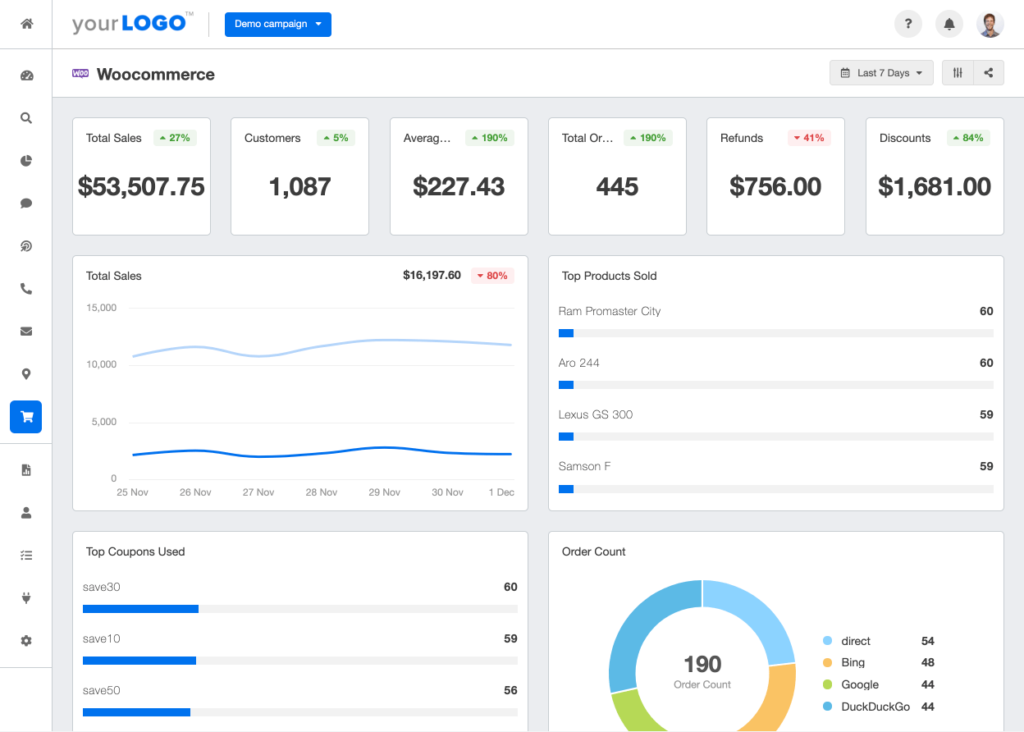
The open-source nature of WordPress and WooCommerce means you can customize every aspect of the customer experience. However, this level of control also requires a greater investment in setup and management. Users often need to manage hosting, security, and compliance with e-commerce regulations. For those interested in customization, a screenshot showing the WooCommerce settings page or a custom product page would be illustrative.
In contrast, ClickFunnels is designed to sell products with maximum efficiency through its sales funnels. While it doesn’t offer the same level of e-commerce features as a dedicated system like WooCommerce, it provides a streamlined process for setting up a product and selling it quickly. ClickFunnels excels in creating a seamless path for users, from initial engagement to the final sale, which is ideal for single products or a small selection of items.
ClickFunnels integrates with major payment gateways and includes features such as one-click upsells, order bumps, and simple product delivery options. Its e-commerce capabilities are directly tied to its funnel-based approach, which can be very effective for certain types of sales strategies.
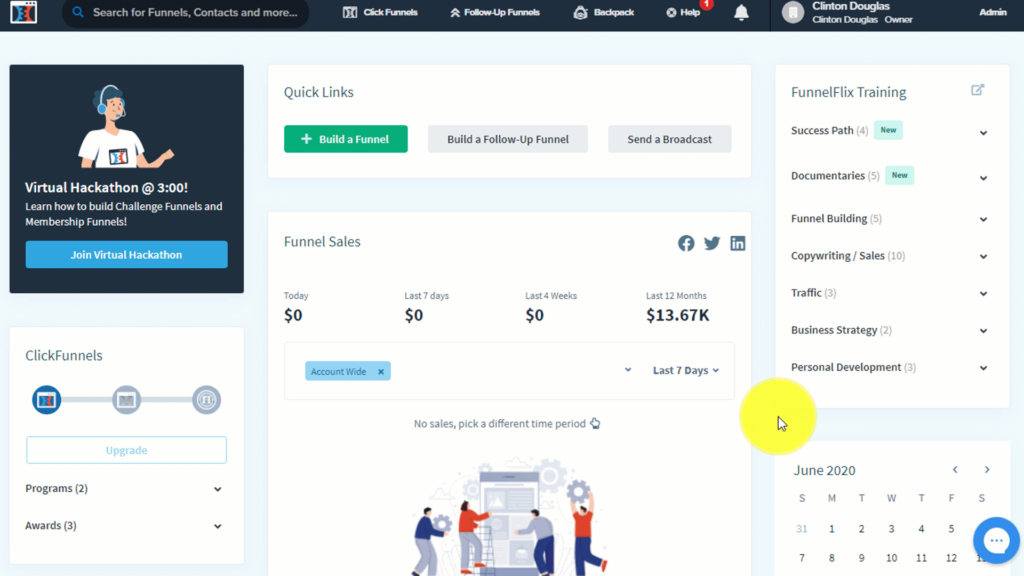
In conclusion, if you’re looking for a platform to build a comprehensive online store with all the functionalities of traditional e-commerce, then WordPress combined with WooCommerce is an excellent choice. However, if you need a platform that’s optimized for quickly selling products through a sales funnel, ClickFunnels offers a straightforward and efficient solution. The decision between the two will depend on the scale and complexity of your e-commerce needs.
SEO and Content Management
In today’s digital marketplace, SEO (Search Engine Optimization) and content management are pivotal for online success. They are essential for driving organic traffic, engaging visitors, and converting users into customers. The platform you choose should bolster your efforts to rank higher in search results while simplifying the process of managing and updating content.
WordPress is a powerhouse for SEO and content management. Its well-structured codebase and logical architecture make it favorable for search engine indexing. WordPress also has a plethora of SEO plugins, such as Yoast SEO or All in One SEO Pack, which provide users with intuitive guidance to optimize their content for search engines. These plugins assist with creating meta tags, generating sitemaps, and offering real-time page analysis to improve SEO scores.
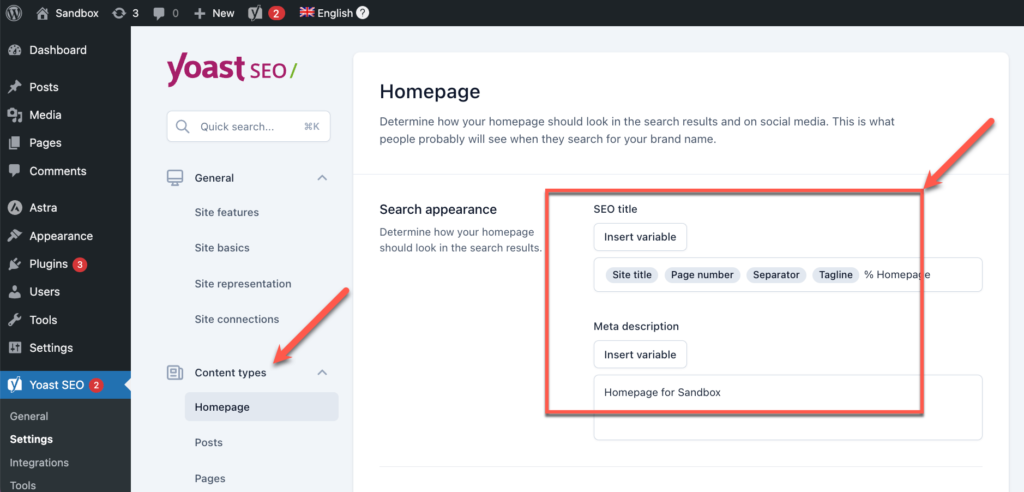
Content management in WordPress is straightforward thanks to its user-friendly dashboard. Users can easily create and edit posts and pages, organize content with categories and tags, and manage media files in the media library. The Gutenberg editor, WordPress’s latest content editor, offers a block-based approach to content creation, making it easier to design complex layouts. A screenshot of the Gutenberg editor in action can illustrate how users can build a post with various content blocks.
Conversely, ClickFunnels is not primarily designed as an SEO tool or a traditional content management system but rather focuses on building high-converting sales funnels. While you can add basic SEO details to your ClickFunnels pages, such as title tags and meta descriptions, the platform has limitations when it comes to content management and SEO optimization compared to WordPress.
ClickFunnels does allow you to create content through its editor, but it’s more suited to creating standalone landing pages and sales funnels than managing a site with regularly updated content. The platform’s strength lies in its ability to create targeted, conversion-optimized funnels that can be tested and tweaked for performance.

In summary, for businesses and individuals who prioritize SEO and require robust content management capabilities, WordPress is the clear frontrunner. Its extensive ecosystem of SEO tools and the flexibility of its content management system make it an excellent choice for those looking to maximize their organic search potential. On the other hand, ClickFunnels serves a different purpose, emphasizing sales funnels over content-rich websites, which may be the deciding factor for users focused on conversion optimization over organic reach.
Integration and Plugins
The ability to integrate with other tools and services can significantly extend the functionality of your website or sales funnel. Plugins and integrations facilitate the seamless connection of various software, helping businesses streamline operations, enhance user experience, and automate workflows.
WordPress is renowned for its vast ecosystem of plugins. With plugins, you can add virtually any functionality to your site, from SEO tools and social media feeds to complex e-commerce systems and customer relationship management (CRM) software. The official WordPress repository, along with third-party marketplaces, provide tens of thousands of plugins. This extensive range of options ensures that businesses can find a plugin for almost any use case.
For example, integrating an email marketing service like Mailchimp is as simple as installing its plugin and configuring the settings.

WordPress plugins are designed to be user-friendly, often with their own dedicated settings pages and setup wizards. This makes it easy for website owners to manage their integrations without needing specialized technical knowledge. Nonetheless, it’s essential to keep plugins updated and to ensure compatibility to maintain site performance and security.
In contrast, ClickFunnels offers a more curated set of integrations focused on the sales funnel experience. While it doesn’t support the sheer number of plugins that WordPress does, it provides integrations with key services that businesses need for online sales, such as payment processors, email autoresponders, and webinar platforms.
ClickFunnels integrates these services directly into its platform, streamlining the process of creating a funnel that interacts seamlessly with other tools. For instance, when you set up a product in ClickFunnels, you can easily connect to Stripe or PayPal to handle payments without needing a separate plugin.
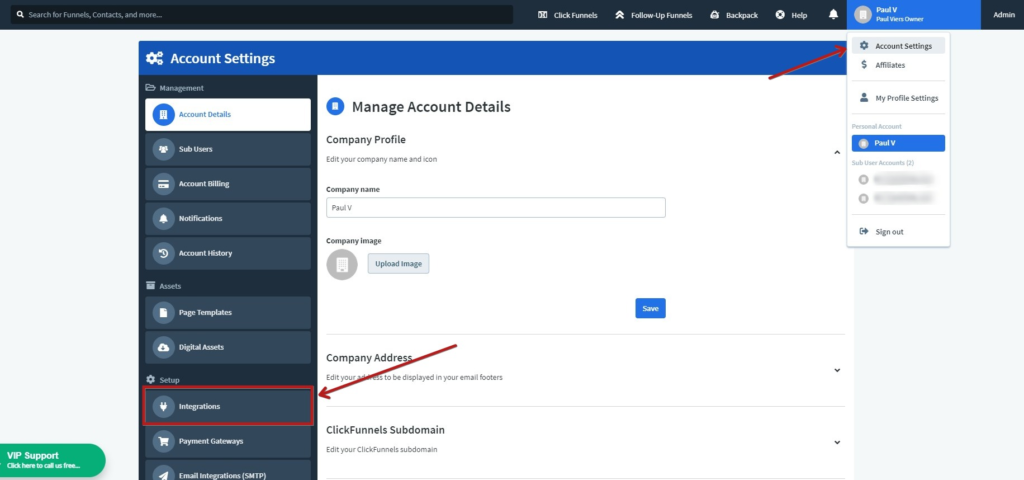
In conclusion, WordPress offers unparalleled versatility with its wide array of plugins, making it suitable for those who need a website with a broad range of functionalities. It’s an ideal platform for those who rely on multiple third-party services and desire a high degree of customization. On the other hand, ClickFunnels provides a more streamlined, though less extensive, set of integrations, focusing on the tools necessary for building and running effective sales funnels. The choice between the two will depend on your specific integration needs and the complexity of the functionalities you wish to incorporate into your online presence.
Marketing and Sales Tools
Effective marketing and sales tools are the lifeblood of any online business. They attract, engage, and convert visitors into customers, and the right set of tools can make or break your online success. When choosing a platform, consider the marketing and sales tools it offers and how they align with your business objectives.
WordPress, being a versatile content management system, offers a wide array of marketing and sales tools through its extensive plugins ecosystem. Whether you need SEO optimization, email marketing, social media integration, or lead capture, there’s a plugin for virtually every marketing need.
For SEO, plugins like Yoast SEO provide comprehensive tools to optimize your content and improve your search engine rankings. For email marketing, solutions like Mailchimp or ConvertKit can be integrated seamlessly to manage your email campaigns and subscriber lists. Social media plugins enable auto-posting to various networks and embedding social feeds right into your site.
When it comes to sales, WooCommerce (WordPress’s most popular e-commerce plugin) provides a complete e-commerce solution, including product listings, shopping cart functionality, and secure payments.
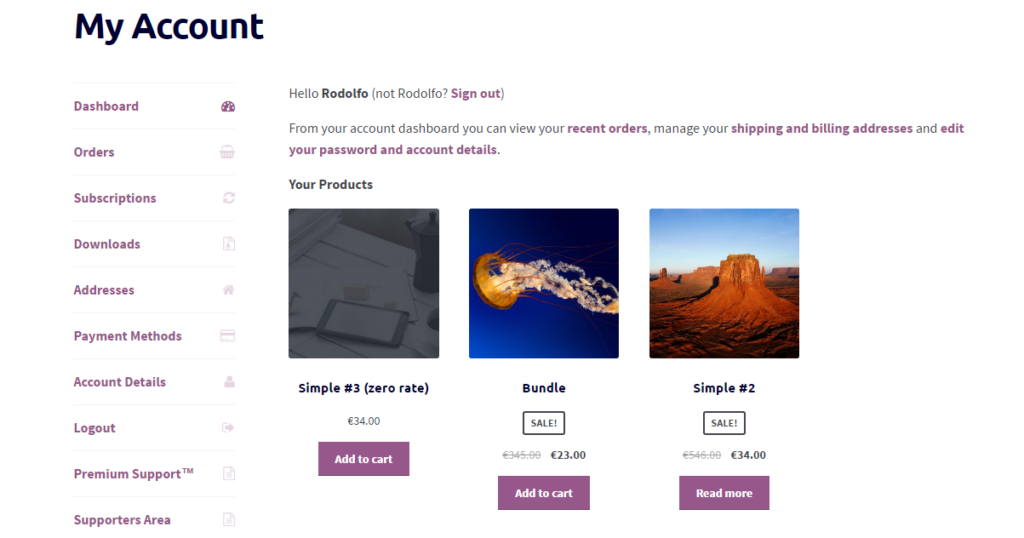
Moreover, WordPress plugins also allow for advanced analytics integration, customer relationship management, and automated workflows, which are crucial for scaling marketing efforts. A screenshot of Google Analytics dashboard integrated with WordPress would give a clear picture of how analytics help in marketing efforts.
On the other hand, ClickFunnels is a dedicated sales funnel builder, which means its marketing and sales tools are built into the core of the platform. ClickFunnels offers a suite of tools designed to guide users through each step of the sales process. It specializes in creating high-converting landing pages, squeeze pages, and checkout flows.
One of the key marketing tools within ClickFunnels is the A/B testing feature, which allows you to test different versions of your sales funnels to see what works best with your audience. ClickFunnels also provides built-in email autoresponders, affiliate management systems, and analytics to track the performance of your funnels.

In summary, WordPress stands out for its flexibility and extensive range of marketing and sales tools via plugins, ideal for businesses that need a full-fledged website with comprehensive marketing capabilities. ClickFunnels, by contrast, is focused on creating and optimizing sales funnels with integrated tools, providing a streamlined and conversion-focused platform for online sales. Depending on whether you require a broad marketing approach or a concentrated sales funnel strategy will determine which platform better suits your needs.
Pricing and Value for Money
When it comes to choosing an online platform for your business, understanding the pricing and value for money is a critical factor. It’s important to assess the cost against the features and benefits to ensure that you’re making a cost-effective decision that will meet your business needs.
WordPress is an open-source platform, which means that it is free to use. However, there are associated costs to consider, such as hosting, domain registration, premium themes, and plugins. Hosting plans vary widely, from shared hosting environments suited for small websites to dedicated servers for large-scale operations.
While there are many free plugins and themes available, premium options often come with a cost but offer advanced features and dedicated support. For e-commerce capabilities, WooCommerce is a free plugin, but you might need to purchase additional extensions for specific functionalities.
The total cost of a WordPress site can range from a few dollars a month for basic hosting to several hundred dollars a month for a high-traffic site with premium plugins and managed hosting services.
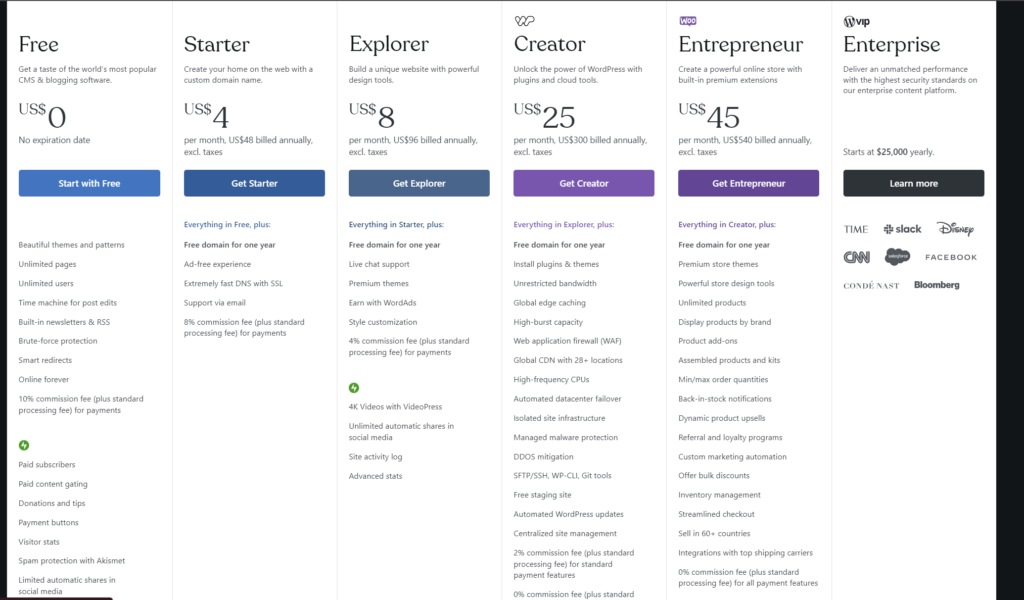
ClickFunnels, on the other hand, is a paid service with a monthly subscription model. The pricing includes hosting, security, and access to the funnel-building platform. ClickFunnels offers different pricing tiers based on the number of funnels, pages, and visitors, as well as additional features such as affiliate programs and advanced integrations.
ClickFunnels is generally more expensive than the starting cost of a WordPress site, but it includes a suite of tools specifically designed for creating and optimizing sales funnels.
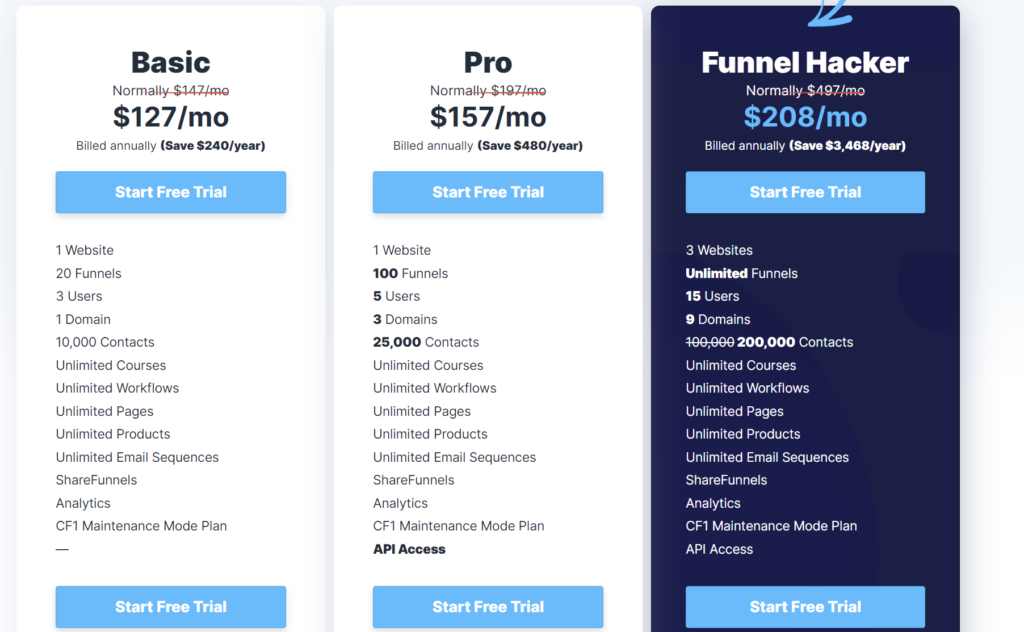
When considering value for money, WordPress is an excellent choice for those who need a flexible and scalable website solution and are willing to invest time in setting up and managing the site. The platform’s wide range of plugins and themes means that businesses can tailor their site to their exact requirements.
ClickFunnels, although more costly upfront, can offer significant value for businesses focused on online sales and conversions. Its all-in-one approach to sales funnels means that businesses can get up and running quickly without the need for multiple third-party tools. The value here is in the convenience and the specialized focus on conversion optimization.
In conclusion, WordPress offers a low entry cost with potential scaling costs as you add premium features, making it a good value for money for those with the time and skills to manage it. ClickFunnels, with its higher subscription cost, provides a comprehensive and conversion-optimized platform that can justify its price for businesses with a strong online sales focus. Assessing your business needs and growth strategy will help you determine which platform provides the best value for your investment.
Performance and Speed
In the digital age, performance and speed are crucial for maintaining a competitive edge. Websites and online platforms must load quickly and run smoothly to retain visitors and convert leads. Let’s delve into how performance and speed are handled by two popular platforms: WordPress and ClickFunnels.
WordPress is a flexible platform, but its performance and speed can be significantly affected by the choice of hosting, the theme used, the number and type of plugins installed, and the size and optimization of images and other content. An optimized WordPress site on a good hosting provider can load in under two seconds, which is the benchmark for a good user experience.
To optimize WordPress performance, you can use caching plugins, image optimization tools, and content delivery networks (CDNs). Plugins like W3 Total Cache or WP Super Cache can improve site speed by caching your website’s content and reducing server load times.
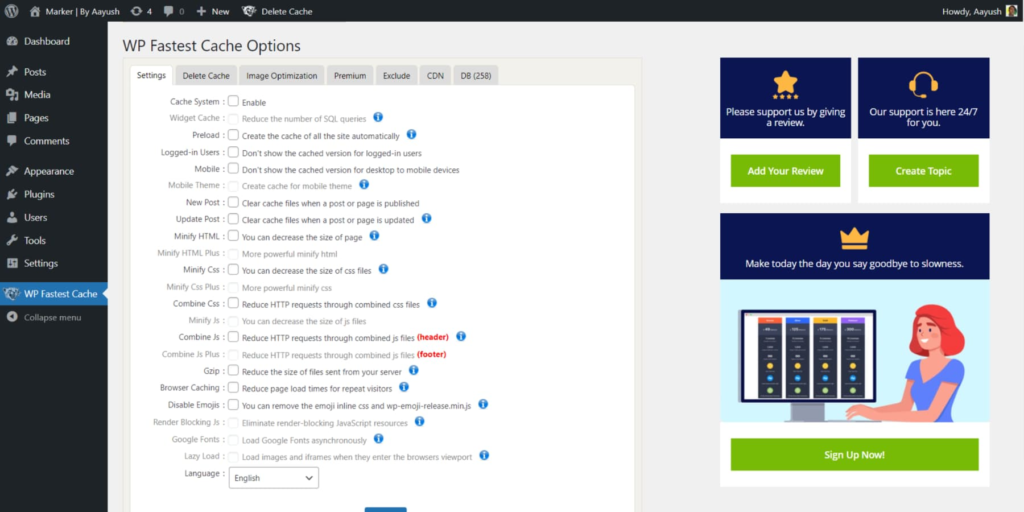
For themes, it’s crucial to choose one that is coded for speed and responsiveness. Similarly, keeping the number of plugins to a minimum and regularly updating them is essential to prevent slow loading times.
ClickFunnels is a hosted platform, meaning that performance and speed are largely managed by the service provider. ClickFunnels is optimized for high conversion rates, and part of that optimization includes loading times. Because the platform is specialized and streamlined, it generally offers good performance out of the box.
Since ClickFunnels hosts all the funnel pages, they are responsible for maintaining server speeds and uptime. Users do not need to worry about finding a host, installing updates, or managing a lot of the technical aspects that can impact website performance.
To illustrate the performance of ClickFunnels, a speed test result image showing the load time of a ClickFunnels page would be effective.
In summary, WordPress offers the potential for high performance and speed, but achieving this requires careful theme selection, prudent plugin use, and potentially additional optimization plugins and techniques. This means WordPress might require a bit more effort and knowledge to keep it running quickly.
ClickFunnels, however, takes care of most performance and speed considerations for you, making it an attractive option for those who want to focus more on content and less on technical optimization. It’s worth noting that while ClickFunnels handles much of the performance management, the actual speed can vary based on the complexity of the sales funnels created.
Ultimately, both platforms can deliver excellent performance and speed when properly managed. Choosing between WordPress and ClickFunnels will depend on your technical expertise, resources, and the specific needs of your business.
Security and Reliability
In the realm of online business, security and reliability are not just important; they’re essential. Customers trust you with their personal information, and any breach can lead to significant financial loss and damage to your brand’s reputation. Let’s compare how WordPress and ClickFunnels handle security and reliability.
WordPress is an open-source platform, which means its code is accessible to everyone. This openness is a double-edged sword; it allows for extensive customization but can also expose sites to security vulnerabilities if not properly managed.
Security in WordPress is largely the responsibility of the site owner. It is crucial to keep WordPress core, themes, and plugins updated to their latest versions, as these updates often include security patches. Additionally, using strong passwords, implementing two-factor authentication, and installing security plugins like Wordfence or Sucuri can fortify a WordPress site against common threats.
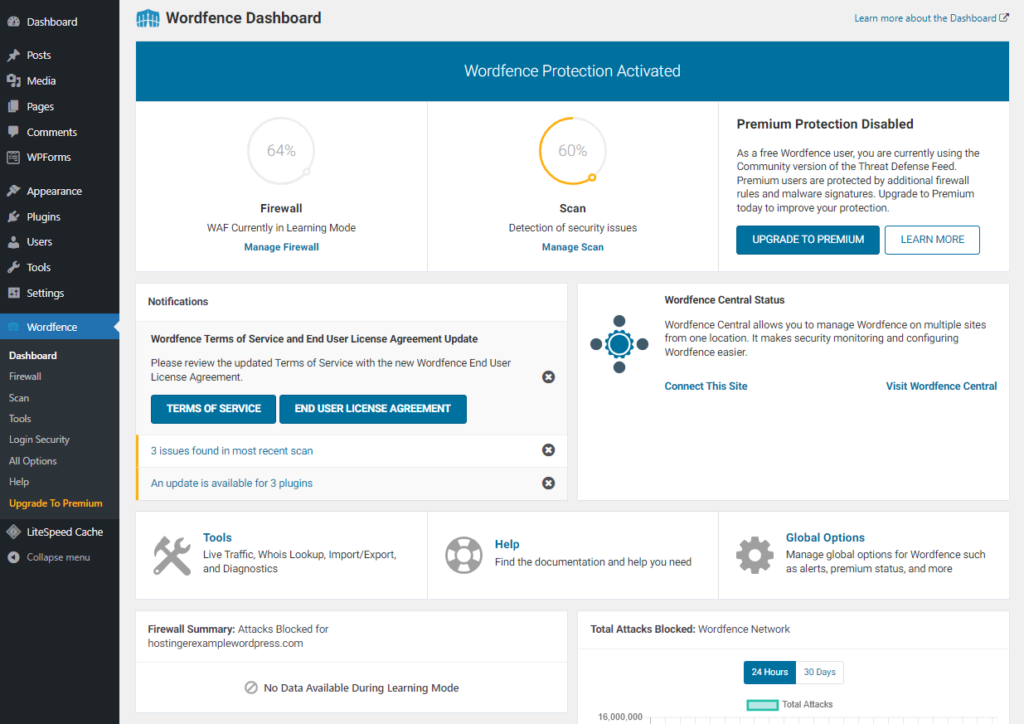
WordPress sites can also be backed up regularly to ensure that, in the event of a problem, you can restore your site to a previous, secure state. Hosting providers often offer automatic backup solutions, but it’s wise to have an independent backup strategy as well.
ClickFunnels, as a hosted platform, takes care of much of the security for you. ClickFunnels manages server security, maintains software, and ensures that all transactions are secure. They provide SSL encryption for all pages, which is a standard security feature for online transactions.
Being a proprietary platform, ClickFunnels does not disclose much about its internal security measures, but it is compliant with various security standards and regulations which is reassuring for users. The reliability of ClickFunnels is also upheld by its hosting services, which are designed to handle high volumes of traffic and are monitored around the clock.

In conclusion, WordPress offers more control over security and reliability but requires a proactive approach from the site owner to manage updates, backups, and security configurations. ClickFunnels, on the other hand, provides a more hands-off approach, managing security and reliability at the platform level, which can be a significant advantage for users who are not technically inclined.
Both platforms can be secure and reliable, but the path to achieving these goals differs. WordPress is best suited for those who have the capability to actively maintain their site, while ClickFunnels is ideal for users seeking an all-in-one solution with security taken care of by the provider.
Support and Community
For users of any platform, a robust support system and a strong community are vital. They ensure that you can get help when you need it and learn from the experiences of others. Let’s explore the support and community aspects of WordPress and ClickFunnels.
WordPress boasts a vast and active community. Being open-source, it has a large number of developers, users, and enthusiasts who contribute to the platform’s growth. The WordPress.org forums are a treasure trove of information, where you can ask questions and receive guidance from seasoned WordPress experts.
Additionally, there are countless blogs, online courses, webinars, and workshops dedicated to WordPress. Many developers and agencies specialize in WordPress, offering professional services if you need more personalized help.
For visual learners, a screenshot of the WordPress support forum with a lively discussion thread would demonstrate the community’s readiness to assist.
Another aspect of WordPress’s support is the plethora of documentation available online, including detailed guides, tutorials, and FAQs that cover almost every aspect of using the platform.
ClickFunnels provides a different type of support experience. As a paid service, it offers official support to its users through a ticket system, live chat, and even phone support in some cases. ClickFunnels also has an extensive knowledge base where users can find articles, guides, and video tutorials on how to use various features of the platform.
The ClickFunnels community is also quite active, with an official Facebook group that has a large number of active members. This group is a place where users can share strategies, offer advice, and provide support to one another.

In conclusion, both WordPress and ClickFunnels offer robust support and community networks. WordPress, with its open-source nature, provides a vast array of free resources and a community-driven support system that’s invaluable for both beginners and advanced users. ClickFunnels offers a more structured support approach with multiple channels, which can be very helpful for users who want guaranteed support as part of their subscription.
Choosing between WordPress and ClickFunnels will depend on your preference for community engagement versus structured, official support. Both platforms are backed by enthusiastic and knowledgeable communities, ensuring that you’ll have access to the help and resources you need to succeed.
Scalability
Scalability is a critical factor for businesses to consider when building an online presence. It refers to the ability of a website or platform to grow and handle an increasing number of visitors or transactions without compromising performance. Let’s examine the scalability of WordPress and ClickFunnels.
WordPress is known for its scalability. Due to its widespread use, from personal blogs to large corporate websites, it has proven to be a platform that can grow with your business. The scalability of a WordPress site is largely influenced by the hosting environment, the efficiency of the code, and the use of performance optimization tools.
For those starting out, basic shared hosting may suffice. However, as traffic grows, you can migrate to more robust solutions such as VPS, dedicated servers, or managed WordPress hosting services that offer scalability options like one-click scaling and more powerful hardware.

It’s also important to use well-coded themes and plugins to ensure that additional features don’t slow down your site. For large-scale operations, you might consider using a Content Delivery Network (CDN) to distribute the load, reduce latency, and improve user experience across the globe.
ClickFunnels is designed to be scalable as well. Being a hosted solution, ClickFunnels manages the technical aspects of scalability for you. The platform is built to handle spikes in traffic, which is particularly important for businesses that experience sudden surges, such as during product launches or marketing campaigns.
ClickFunnels offers different pricing tiers, each designed to accommodate the growing needs of your business, from a limited number of funnels and visitors to unlimited funnels with high traffic capacities.
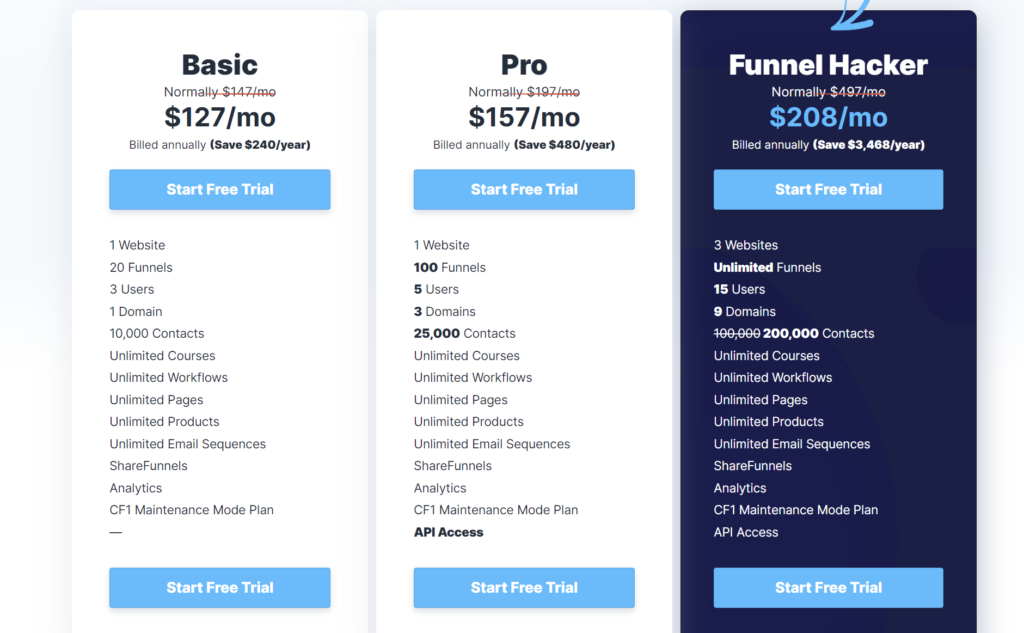
In conclusion, both WordPress and ClickFunnels offer scalable solutions for businesses. WordPress provides the flexibility to scale through various hosting options and the use of performance optimization tools, but it requires a bit more hands-on management. ClickFunnels simplifies the process by managing scalability for you, catering to businesses that prefer a more hands-off approach and expect their platform to automatically adjust to their growth. Choosing the right platform depends on your business model, technical expertise, and how much control you want over the scalability process.
Success Stories and Case Studies
Success stories and case studies are powerful tools. They provide real-world proof of a platform’s capabilities and can inspire potential users. Let’s look at how success stories and case studies from WordPress and ClickFunnels highlight each platform’s strengths.
WordPress Success Stories
WordPress is a versatile platform that powers over 40% of the web. Its success stories range from small blogs that turned into high-traffic sites to large businesses that use WordPress to power their online presence.
For instance, The New Yorker, TechCrunch, and BBC America are examples of high-profile websites built on WordPress. These sites handle millions of monthly visitors, showcasing WordPress’s ability to scale.

Freelancers and agencies often publish case studies demonstrating how they have built complex, feature-rich websites for their clients using WordPress. These case studies can be a goldmine of information, showing the flexibility of WordPress in accommodating a wide array of business needs.
ClickFunnels Success Stories
ClickFunnels markets itself as the go-to platform for marketers and entrepreneurs looking to grow their businesses online. The platform has numerous case studies of users who have significantly increased their sales and leads by using ClickFunnels to create optimized sales funnels.
One notable example is the story of an entrepreneur who went from zero to a million dollars in sales within a year by leveraging ClickFunnels’ sales funnel capabilities. Another case study might feature a small business that increased their conversion rate and doubled their revenue after switching to ClickFunnels.

ClickFunnels also hosts an annual event called Funnel Hacking Live where successful users share their stories and provide insights into their strategies. These presentations often turn into case studies that serve as valuable learning material for other users.
In conclusion, both WordPress and ClickFunnels have a wealth of success stories and case studies that demonstrate their effectiveness. WordPress case studies often highlight the platform’s versatility and ability to handle high traffic volumes, while ClickFunnels case studies emphasize the platform’s ability to efficiently convert traffic into sales. These narratives serve as a source of inspiration and a blueprint for others looking to achieve similar results. When choosing between WordPress and ClickFunnels, consider looking at these success stories and case studies to better understand how each platform could cater to your business goals.
Conclusion
In summary, both WordPress and ClickFunnels offer unique advantages that cater to different business needs and preferences.
WordPress is a flexible and scalable open-source platform that powers a significant portion of the web. It is suitable for a wide range of websites, from simple blogs to complex e-commerce sites. The key advantage of WordPress is its extensive customization options, which allow for complete control over your website’s design and functionality. However, this flexibility comes with the responsibility of managing your own security, updates, and scalability.
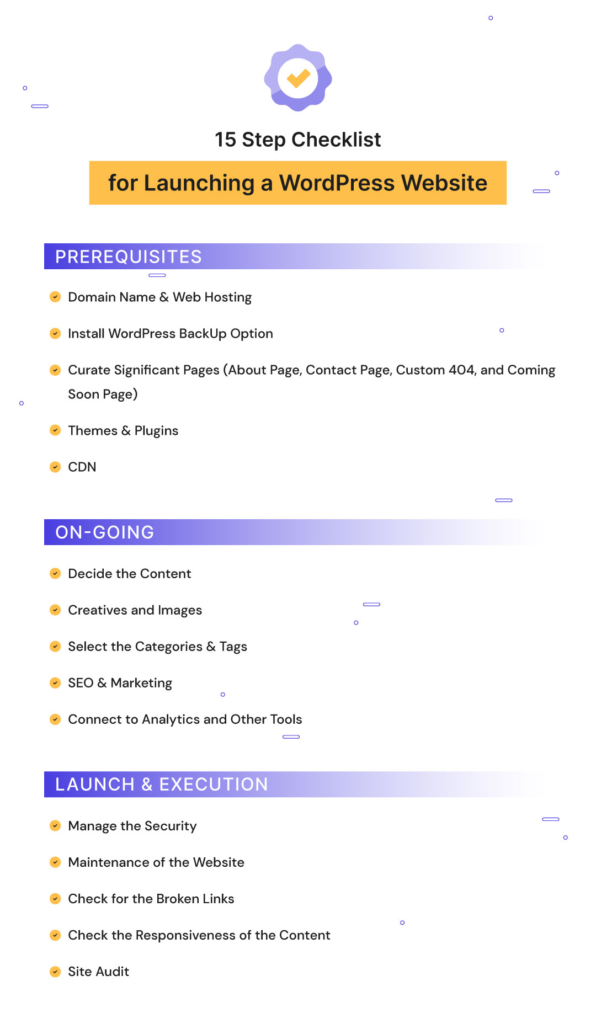
ClickFunnels is a user-friendly, all-in-one sales funnel builder designed to help businesses convert visitors into customers effectively. It is a great choice for entrepreneurs and marketers who want to create high-converting sales funnels without delving into the technicalities of web development. ClickFunnels provides a more streamlined and focused approach to building an online business, with less emphasis on website customization but more on the marketing funnel aspect.
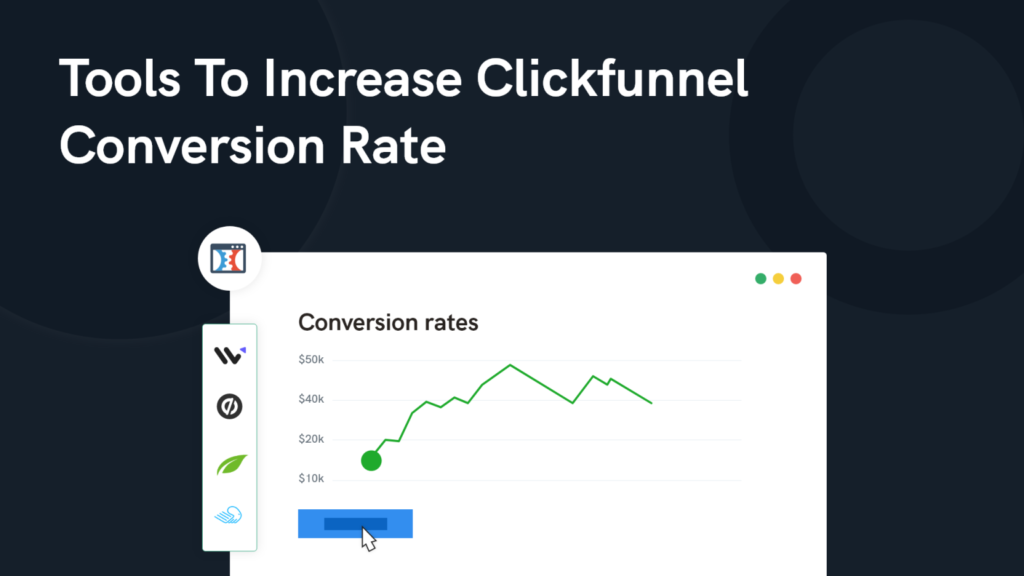
When it comes to choosing between WordPress and ClickFunnels, it ultimately depends on your specific needs:
- If you require a comprehensive website with custom features, and you have the technical know-how or resources to manage it, WordPress is likely the better option.
- If your main goal is to quickly create sales funnels and you prefer having the technical aspects handled for you, ClickFunnels may be the way to go.
In the end, the focus keyword “conclusion” brings us to the final consideration that there’s no one-size-fits-all answer. Your decision should be based on a careful evaluation of your business goals, technical expertise, available resources, and long-term digital strategy. Whether you choose WordPress or ClickFunnels, both platforms have a proven track record of supporting successful online ventures.

